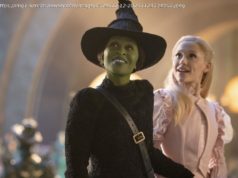The music sequences are engrossing, but the film alternates between genre cliches and a skewed puritianism.
DF-14964_R – Rami Malek (Freddie Mercury) and Gwilym Lee (Brian May) star in Twentieth Century Fox’s BOHEMIAN RHAPSODY. Photo Credit: Alex Bailey.
The Credits:
Opening Nov. 2,2018 in North America, courtesy of 20th Century Fox, Bohemian Rhapsody is a big(ish) budget biopic of famed Queen lead singer Freddie Mercury, tracing the origins of the band through their performance at the Live Aid concert in 1985. While he was eventually fired by Fox and replaced by Dexter Fletcher ( Eddie the Eagle, the upcoming Elton John biopic Rocket Man), Bryan Singer will retain sole directorial credit for this Anthony McCarten-penned film. Produced by Graham King and Jim Beach with GK Films, Fox and Regency, the Raimi Malek vehicle begins its worldwide spring today in the United Kingdom. Edited and scored by John Ottmam, the Bryan Singer flick is shot by Newton Thomas Sigel.
The Review:
Bohemian Rhapsody is a biopic of a very famous rock star which only comes alive when the music takes center stage. It is a painfully by-the-numbers biopic, squeezing the narrative into a Walk Hard box while struggling with the simple fact that (at least as portrayed in this film) Freddie Mercury’s life wasn’t all that cinematic. Just because someone makes great art and has an interesting personality doesn’t mean they merit a narrative feature film based on their life and exploits. When Mercury and his bandmates are working their magic, the movie will rock you. But when its going through the biopic motions, you won’t be having a good time (having a good time).
The Bryan Singer-directed picture, and yes, he gets sole credit despite being fired and replaced by Dexter Fletcher, is a big-scale drama, and I will happily admit that the music is so good (no kidding) and the concert sequences are indeed a kind of magic that it barely works as surface-level entertainment. The film’s climax (spoilers?) concerns the Live Aid concert, held to combat famine in Africa, where Queen essentially cemented their place in rock history. And, yeah, it’s a toe-tapping knockout, to the point that I would argue that staging this sequence was the main reason anyone wanted to make the movie, and it remains the best reason to see it.
Raimi Malek is terrific, and his musical moments work both as mimicry and resounding stagecraft. We cut to the chase quickly, with Mercury (Malek) replacing a just-departed lead singer and helping to launch his bandmates into the stratosphere. There is too much emphasis placed on what a musical/artistic genius Mercury was. There is only so much entertainment value in seeing someone write a lyric, smile to himself and have everyone else proclaim him brilliant. That’s a general musical biopic problem, and by default, the most engrossing musical moments are when the other bandmates (Gwilym Lee as Brian May, Ben Hardy as Roger Taylor and Joseph Mazzello as John Deacon) come up with iconic songs and beats.
Perhaps due to the participation of the surviving bandmates, May, Taylor and Deacon come off well. Even Mercury is shown (when he’s not otherwise distracted) as valuing the input and talents of his proverbial co-stars. But the movie itself fails to break free from the biopic formula, specifically with detours into Mercury’s personal life that inexplicably reframes his life story as an Afterschool Special about the dangers of partying and gay sex. Yes, Freddie is absolutely presented as bisexual in this picture, but the film essentially argues that he would have been fine had he remained in a monogamous hereto relationship with Lucy Boynton’s Mary Austin. Whether it’s homophobic or old-school slut-shaming, it’s icky.
I don’t pretend to know how much of what we see is factual, and frankly, I don’t care since this isn’t a documentary. But the lengths to which Bohemian Rhapsody seems under pressure to both acknowledge Mercury’s sexual orientation and happy hedonistic lifestyle while also making the film safe for culturally conservative audiences who mostly know Queen from Wayne’s World is bewildering. With all the online handwringing about whether the movie would acknowledge Mercury’s less PC moments, well, this is a case where outright straight-washing might have been almost preferable to what we got. Yes, Freddie is bisexual, but his main same-sex lover (Allen Leech’s Paul Prenter) is presented as the film’s defining villain.
I don’t want to obsess over this one aspect, but it’s frankly jaw-dropping that Hollywood managed to make a homophobic Freddie Mercury biopic. And as much as I mostly enjoyed the movie when it was focused upon the creation of music (less so the surface-level look at late-1970’s/early 1980’s showbiz), it’s hard to recommend a movie that implicitly denounces the very demographics that were most inspired by the life and times of its subject. It doesn’t help that the movie so explicitly sticks to the formula (including a disapproving dad) that it feels like a straight-up take on Jake Kasdan’s satirical Walk Hard. Like All Eyez on Me, I watched the alleged nonfiction events with total disbelief.
Malek is terrific in the lead role, while everyone else (including Benton and a camo-ing Mike Myers) does what they can to elevate the rote material. The music and the making of the music are suitably rousing, but the biographical content alternates between Wikipedia skimming, genre tropes and a skewed kind of puritanism that will inspire countless post-release think pieces. The film looks good and is suitably
“big,” and yes, the concert scenes will probably look great in IMAX. But this is a deeply strange misfire, creating a biopic seemingly intended to specifically appeal to the very demographics most inclined to hate its central figure. Raimi Malek is a champion, but everyone else comes off as a loser.
I’ve studied the film industry, both academically and informally, and with an emphasis in box office analysis, for 28 years. I have extensively written about all of said subjects for the last ten years. My outlets for film criticism, box office commentary, and film-skewing s…
If you like what you’re reading, follow @ScottMendelson on Twitter, and «like» The Ticket Booth on Facebook.
Домой
United States
USA — Music 'Bohemian Rhapsody' Review: Freddie Mercury Gets Slut-Shamed In Homophobic Biopic






